Aimee Voelz
Maybe your life sucks because your job sucks
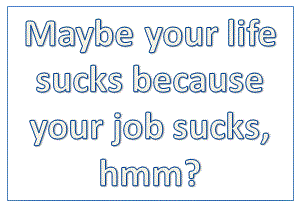 For the last two weeks I’ve been writing about how life can suck and then it gets better. Now I’m going to show you this really cool trick where you can take any topic that you’ve been writing about and connect it back to the main point of your blog, which in my case is about careers. Are you ready? Here goes:
For the last two weeks I’ve been writing about how life can suck and then it gets better. Now I’m going to show you this really cool trick where you can take any topic that you’ve been writing about and connect it back to the main point of your blog, which in my case is about careers. Are you ready? Here goes:
First of all, a lot of times our lives suck because our jobs suck, and those jobs almost never get better. When they improve, it is usually because your evil boss got fired, you moved to a new team or a new manager, or you got a big promotion that will make you happy for about two weeks. Usually it doesn’t get better, and that’s why I’m writing a book about quitting jobs, so you can go do something else that doesn’t suck.
This is true.
But there is an even deeper connection to how and why our lives suck when we’re in the wrong jobs. The reason is that when you are working in an environment that doesn’t support your authentic self and is not in alignment with your values, it is not the right job for you. No matter how much it pays, how important your title sounds, or how fancy your office is, if your job isn’t a part of living your “right life”, then it is not going to be pleasant.
You might love some parts of your job, and that can make it confusing. I sure adored the team of people I used to work with and was incredibly passionate about the program I was responsible for.
Our relationship to work is similar to any relationship, and there’s ups and downs, good and bad, and changes. It took me a long time to let go of my last full-time employee position because of the positive things about it. But once I realized that it wasn’t the right environment for me to be my truest self, I started planning my exit.
When I finally quit and began aligning my choices with my values, my life became magical. Really. I’ve written about it before, but it still amazes me how much easier and fun life was. Quitting my job had the biggest impact on my life, but along with that I made other changes to be truer to myself. I let go of some people that made me feel dragged down instead of uplifted. Instead of spending all my time working or sleeping, I pursued my interests in animal sanctuaries, started writing again, and looked for ways to tap into my creativity.
After quitting, there was a period of uncertainty and I wasn’t sure exactly what to do, so I just kept living day by day and sometimes hour by hour, making choices that felt like I was staying on track with my values. When things would start to go sideways, I would course-correct immediately. It wasn’t long before I found my way into my consulting business that I love, made deep and lasting friendships and was happier than I had ever been before.
Then, of course, there came the tough times and challenges. Living my “right life” didn’t prevent my beloved cat from getting sick and dying, it didn’t stop my family from having difficulties, and it sure didn’t block out the personal issues I’m facing now. Those things are still hard and hurt…you know, the life sucks part.
Yet I am coping with tough times so much better than I would have when I wasn’t living as close to my ideals. I have a better support system to help me now. I have many things to be grateful for, including my amazing work-life, many people I care about, and appreciation for living in such a beautiful part of the world. The magic is still there. It is just working in subtler, persistent ways.
I’m choosing to believe that part of the reason for my struggles is that there is an area of my life that needs to change. I don’t know exactly what steps I need to take, or what the outcome will be. I’m not even sure if it is an external life change or internal self-development. But I know, because I have experienced this before, that as long as I stay true to myself I’ll make the right decisions at the right time.
This faith gets me through the toughest moments.
Faith, gratitude, and my sense of humor. When times are really good or really rough, I like to name my moods and my outfits, act a little reckless while remaining completely safe, and make playlists. Stay tuned for the “when life sucks but actually everything is going to be ok” playlist, coming soon.
Sometimes life sucks and then it gets better, Part 2
 Last week I wrote about how sometimes life sucks and then it gets better. I think I oversimplified it. Because sometimes life sucks and then it gets better and then it gets even worse before it gets better again. Or life sucks and keeps getting worse and you have no idea when it is going to get better and then finally it does.
Last week I wrote about how sometimes life sucks and then it gets better. I think I oversimplified it. Because sometimes life sucks and then it gets better and then it gets even worse before it gets better again. Or life sucks and keeps getting worse and you have no idea when it is going to get better and then finally it does.
Lately I’ve been praying for the highest good in my life because I don’t know exactly what that will turn out to be. Since I don’t know for sure if the things that seem like the best things for me truly are, it seems best to just pray for the best outcome.
Yesterday I prayed like mad. Like full on, praying to God, the Universe, my angels, my guides and even my deceased relatives to give me something I thought I needed. Not needed like, “I’m so tired, I need a cup of coffee.” Something I thought I needed to get through a rough time (which I still want to keep private, so thanks again for not asking about it!). I was even throwing out the caveat, just in case, “everything else for the highest good, but please give me this one.”
I didn’t get it.
So.
Okay.
That hurts.
It feels like a 100 pound weight on my chest, I’m sick to my stomach, I have thoughts in my head that I don’t want to be thinking and memories of similar times that I don’t want to remember. Yet there is still work to do, taxes to file, and plants to water so they don’t burn up in this boiling heat wave we’re having.
I watered the plants, got the work done that most needed to be taken care of, and will file my taxes before I get off the computer. Everything else can wait.
I called a friend who is a good listener and gets this kind of thing. I still recognize and appreciate the things that are going well in my life. I scraped together a plan for the weekend. I made myself drink a green protein smoothie because I need the energy to keep going until it finally gets better.
And it will. I know it will.
Sometimes life sucks and then it gets better
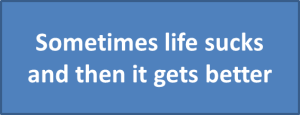 Sometimes life sucks. Stuff happens. You’re stressed out. Don’t feel like your normal self. Aren’t up to doing all the things you used to do.
Sometimes life sucks. Stuff happens. You’re stressed out. Don’t feel like your normal self. Aren’t up to doing all the things you used to do.
It could be for any or multiple reasons, right? We’ve all been there.
I’m there.
I like keeping my private matters private, so I’m leaving the details out. Thanks for understanding and not asking about it!
And anyway, I don’t want to talk about the details. I want to talk about how I’m handling it.
I’m prioritizing my health and wellbeing, the people I care about, and doing the very best I can for my clients.
So how is that going?
Well, business is great. The people I interact with from day to day are the best I could ask for, and I like my job every single day. So that’s good!
I am focused on doing great work for my clients. I am not, however, taking on much new work, finishing my book, or posting my blog every Thursday (thanks for noticing, by the way). Payroll and taxes are on track but my QuickBooks is more than a little out of date. I’m not up for all of it right now, and would rather focus on the most important stuff and do the rest when I can.
My health and wellbeing and the people I care about are up and down. Good days, bad days, fun days, sad days. I haven’t been to yoga in over two weeks, but went dancing and golfing for the first time in eight or nine months. I’m reaching out to my friends and family when I need support. But I’m not being a great friend to all of the people that matter to me because I don’t have the energy for it. I try to let them know I care and be there when it counts the most.
The negative stuff is temporary. I’m looking forward to getting past it and excited for the future. Overall life is good, I’m fortunate, and I know it. Grateful.
People say “be gentle with yourself” when you’re going through a rough time. Well, yes, but what does that mean exactly? For me it means I know my priorities and that’s what I’m focused on. I’m doing the best I can with what I’ve got.
I hope you are doing great. And if you’re not, I hope you’re also focusing on the most important things and letting the rest go until you’re ready for it.
Because Life’s a Bittersweet Symphony and sometimes you gotta just Shake it Off.
Free Your Identity From Your Job
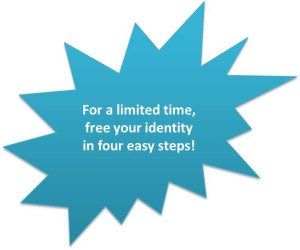 It is easy to let your job become your identity. Especially if you have a title or function that is considered high-status, or you work for a well-known organization. This manifests as “I’m important because I’m Senior Director of Finance!” or “I’m important because I’m a surgeon!” or “I’m important because my company is a nationally broadcast news station!”
It is easy to let your job become your identity. Especially if you have a title or function that is considered high-status, or you work for a well-known organization. This manifests as “I’m important because I’m Senior Director of Finance!” or “I’m important because I’m a surgeon!” or “I’m important because my company is a nationally broadcast news station!”
American culture and language may be partly to blame for over-identification with work. For example, in French, a guy doesn’t say “I am hungry” because he isn’t the embodiment of hunger. Instead, he says, “J’ai faim”, which more literally translates to “I have hunger.” Wouldn’t it be great if instead of “I am a mechanical engineer”, people thought of their job in terms of “I do mechanical engineering work for a living?”
There would be less annoying egos to deal with and more focus on producing the outcomes that job functions are intended to produce. Haven’t we all been to a party where people ask each other what they do for work and someone puffs out his chest and says “I’m the head of the ______ corporation,” and we think to ourselves, “you might be the head of a company but you’re an ass at this party.”
If you’re taking your identity from work, here are four steps to break free:
Step 1) Stop, just stop using your work email address for your personal correspondence. Using “me@mycompany” for personal use reinforces to you and everyone you email that you are inseparable from your job. I will reblog this point until you stop.
Step 2) Acknowledge to yourself that you are not your job. You are a person who does work in exchange for a paycheck. No matter what title you have, whether you work for yourself or someone else, regardless of your salary and how much or little your role is favored by society; you are still not your job.
When interviewing people about quitting their jobs, many men told me they took their identity from their work. Women often told me they think of themselves first as a mother or wife and then in terms of their work. I dislike all of this because it is taking on identities from factors outside of yourself. If you are your job, what are you when the job goes away? If your reason for existing is your child or spouse, what happens when they turn on you or disappoint you, or you end up living vicariously through them?
You can still be an employee/parent/spouse and be happy and proud of being those things. I hope you are! That is different from getting your sense of self from them.
Step 3) Start defining yourself by your own qualities and attributes. Then repeat the words to yourself, silently or aloud, every single day, until you believe it. For example, “I am a kind, generous person” or “I am strong and resilient”. Your job can’t take your innate characteristics way from you.
Step 4) Have a life outside of work. Spend time with people other than your coworkers. Have a hobby. Participate in a club or organized group. Yes, you spend many of your waking hours at work. Maybe too many. It is said you can tell a person’s priorities by how they spend their time and money. Make your life bigger than your job by caring and participating in activities that have nothing to do with work.
If you need to spend more hours working each week than on any other single activity, you can make your reason for working have more meaning. You’re supporting a family with your salary. You’re learning a skill that will allow you to transition to a better job. You’re saving money so that you will have more choices about work in the future.
And then? Do step number one right now and the repeat steps two through four until you identify yourself by your unique qualities or you die, whichever comes first. C’est tout.
Blahg Blahg Blahg
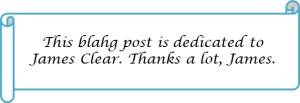 I didn’t publish a blog post last week. Work was great, but I was feeling the accumulated effect of other stresses in my life and when Thursday evening came around, I went to bed early instead of writing a post. I figured I would post something by Sunday at the latest, because I’ve done that before when I didn’t feel like I had the energy to meet my self-imposed Thursday deadline.
I didn’t publish a blog post last week. Work was great, but I was feeling the accumulated effect of other stresses in my life and when Thursday evening came around, I went to bed early instead of writing a post. I figured I would post something by Sunday at the latest, because I’ve done that before when I didn’t feel like I had the energy to meet my self-imposed Thursday deadline.
Then it was the weekend and I slept through a lot of it, spent some time planting and watering and pruning the shrubs and trees around my house to relax, and zoned out reading books. Then on Sunday night instead of writing a blog post I started laying out a poetry manuscript for a chapbook contest that is ending soon. I stayed up way too late, until 3AM, sorting through my poems and formatting them into a 6 x 9 inch word document. Didn’t finish the chapbook and didn’t even attempt a blog post.![]()
Monday I was exhausted, of course, and went to bed early again. And today I rushed from one meeting to the next and to appointments after work and got in bed at 8:30PM for another early night. I read through my emails on my smartphone to make sure I didn’t miss anything important before going to sleep, and read this:
“What I Do When I Feel Like Giving Up”, by James Clear. It starts off with “I’m struggling today. If you’ve ever struggled to be consistent with something you care about, maybe my struggle will resonate with you too.” And then he goes on to write about how he’s consistently posted on his blog twice a week since November 2012.
Dammit, James.
I was ready to push off the guilty, nagging feeling I had about not blogging and prioritize my rest. Until I read his damn post. The entire article was about how he didn’t feel like writing that day and how he motivated himself to do it anyway.
Dammit, James!
So now I’m out of bed, at my desk writing this post, which I could have written last Thursday or any day since then but didn’t, until James put it in my face that it is my choice and that there are methods of motivating ourselves even when we feel like giving up. Even when we are convinced our reasons for not writing (or whatever) are rationale, and even when we are this close to tuning out and distracting ourselves.
I’ve even blogged about this topic before and could have taken my own advice. But I didn’t. I let my habit slide and now I’m putting in the effort to get back on schedule. It is a choice, and I could stop blogging or only blog when I feel inspired. My truth is that I do care about writing consistently and sharing what I’ve learned about meaningful work.
So thanks, James. And dammit.
I want to quit my job…two years from now
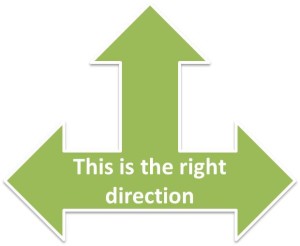 I’ve had a lot of conversations with people who tell me they want to quit their jobs, but not right now. They want to quit in two years. The most common reason is that people want to stop doing their current work and do something else…but they don’t know what that is. For some reason they think that in two years they will have figured that out.
I’ve had a lot of conversations with people who tell me they want to quit their jobs, but not right now. They want to quit in two years. The most common reason is that people want to stop doing their current work and do something else…but they don’t know what that is. For some reason they think that in two years they will have figured that out.
However, when you’re working a ton of hours in a stressful position, you don’t have much mental space or energy to determine what your next best job is. Plus, your free time is spent recovering or distracting yourself from your unhappy situation.
I feel your pain.
It wasn’t until I made up my mind that I was going to quit my job that I began to have ideas about what my future might look like. There was a definitive moment, a changing of my mindset, when I set my intention to quit. I turned my focus away from trying to make my current job situation better and focused on creating a better life. Like magic, I started getting inspired and followed my interests as far as they would go.
Here are a few examples of the actions I took and what they led to:
- After eight years without any creative writing, I started filling notebooks again. The ideas for stories, poems and lyrics popped into my head without even trying. I decided that after I quit my job I would spend a month at Naropa University’s Summer Writing Program. Once there, I wrote the outline for my self-help book for people who want to quit their jobs. I started this blog. I also kept writing creatively, joined writing groups, and volunteered with a literary magazine.
- I began researching and visiting animal sanctuaries. I documented their best practices and what they needed to improve. I have no idea if this will lead to any paid work in my future, but it was meaningful to me. The current outcome is that I have three favorite animal non-profits: Best Friends Animal Society, Chimpanzee Sanctuary Northwest and The Wild Animal Sanctuary.
- I realized that my love of research, analysis, report-writing and justice could lead to a career in private investigation. I got certified, built a marketing plan and decided this would be my next job. In case you haven’t been following my blog – I did not become a P.I. But planning to be a P.I. gave me the courage to quit my job and continue pursuing my interests until I ultimately began my consulting business.
Which leads me to this point: you don’t have to figure out your next job right now. All you have to do is follow your interests. Two years from now, your ideal job may be completely different – and better – than anything you can dream of now.
Happily, I’m not a data point of one. Many people who I spoke with followed a winding path to a satisfying career. If you need more convincing, read Martha Beck’s Finding Your Way in a Wild New World.
If you’re convinced but are thinking “what do I do now, I don’t even know what I’m interested in”, just experiment with one small, easy thing that you will enjoy doing. Make something with your hands. Revisit an old hobby. Do something you liked doing as a kid. Talk to a friend in a career that you may be interested in. Take a class or an evening workshop in a subject you are curious about. Read.
If you’re on the right track, more and more opportunities will open up to you, just as starting to write poetry again led to a month of writing classes and my book-in-progress.
When you’re not on the right track, you’ll lose interest or life will throw signs at you that it is time to change direction. For example, as I neared the date when I planned to quit my job, I began to doubt that a formal career in investigation was the right choice even though I enjoyed the process leading up to it. At the same time, a former coworker and I came up with a business idea and created an LLC in a blink. Several months later I realized our company wasn’t going to generate a salary and I moved onto my backup plan of consulting, which turned out to be a perfect career for me.
I didn’t cling to my initial idea out of stubbornness or misplaced determination. I was open to each new opportunity and was willing to move forward or change my plans as I went along. I like the metaphor of walking on a path with a lantern that only illuminates the step you’re at and where to place your feet next.
For example, if you are interested in making elaborate, one-of-a kind cakes, you don’t have to buy a bakery or launch a catering business. Have a friend or two commission desserts from you and if you enjoy it, do more. You might find that you only want to bake cakes for your loved one’s birthdays because it is a creative outlet and you feed off of their gratitude. Maybe you’ll realize you don’t want to make cakes for strangers, you don’t want to bake at all in the summer, and you really don’t want to produce a customer’s requested design if it isn’t a style you’re interested in.
When you pay attention, the universe will give you nudges in the right direction. What matters is that you are taking action. You are signaling that you are open to discovering a new path, one step at a time. If it leads you to another step forward– great! If you dislike it, or the choice generates negative results, then pursue your other interests.
If you’re one of those people who want to quit their jobs in two years, be clear about your intention. Then take one small action and you’re on your way.
Some Career Transitions Take Longer Than Others
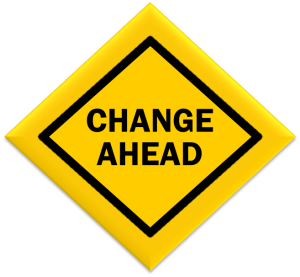 Some career transitions take longer than others. Leaving a project management role at one company for another may be a matter of updating your LinkedIn profile, and making connections with recruiters, and performing well in interviews.
Some career transitions take longer than others. Leaving a project management role at one company for another may be a matter of updating your LinkedIn profile, and making connections with recruiters, and performing well in interviews.
Wholesale career changes might take longer. Not much longer if you’ve got transferable skills, are allied with an influential person at the place you want to work, launch your own enterprise or are just plain lucky.
It takes longer if your new career path requires going back to school for training or degrees, or means taking an entry-level job to gain experience in an unfamiliar field. But time is relative and two or three years of learning the ropes at a low-paying, low-stress, starter position might be the perfect transition between a job you hated and a new career that you’ll love for the rest of your working years.
I worked with a guy who transitioned from a six-figure sales job into a lower paid marketing role to build a career with more opportunities. He is savvy and worked hard, and six years later I bet he’s earning more than he did in sales and enjoying his life much better. Another friend moved from a lucrative engineering role to finance because it gives him the experience and credibility he needs for his next career move.
If you dream of a different career but are afraid that it will take too long or cost too much to get there, remember that you can start building the skills you need right now, before you quit. Take a night class. Volunteer in a related field. Go to events focused on your career topic and network. Ask people already in the roles you want to give you thirty minutes for an informational interview, where you ask them what skills and experience are needed to get started, what they actually do each day, and whether they like it or not.
I’ve done all of these things with great results. A series of informational interviews was how I learned early in my career that I wanted to focus on business, marketing and writing, and not on graphic design. I earned my MBA in five years of evening classes, and went to work each morning applying the knowledge I had just learned. I went to conferences and exchanged dozens of business cards with recruiters, executives and friendly people who I connected with. I’m still in touch with many of them.
If you’re still not convinced, read Jennifer Lesher’s blog post from May 20th, where she describes the transition from tech to airplanes. Can you feel her joy? Imagine yourself feeling the same way.
Regaining Confidence After a Bad Work Experience
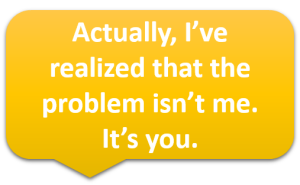 Bad jobs can hurt our souls. Humans thrive on contributing to things larger than ourselves, being productive, positive interactions with others and recognition for our efforts. A job is much more than a means to pay the bills.
Bad jobs can hurt our souls. Humans thrive on contributing to things larger than ourselves, being productive, positive interactions with others and recognition for our efforts. A job is much more than a means to pay the bills.
When a rotten manager tells you your work isn’t good enough – or you’re not good enough, it wounds your spirit. When coworkers blame and shame you, it rips little holes in your psyche. Even if you know that you add value to your company and that you do good work, even if you think your managers and their minions are idiots — constant negative feedback is damaging.
Many people who I’ve spoken with about quitting their jobs told me they lost confidence in themselves because of bad work experiences. These are people who have grown their careers, earned advanced degrees, or led initiatives that made millions of dollars for their companies. Some of them have tough reputations, and aren’t especially sensitive to criticism. Yet the negativity they endured made them unsure of themselves.
If you haven’t experienced a job like this and you’re not close to someone who has, you might be thinking, “If they were such great workers, why did their managers treat them so poorly?” Well, that is the reality of many organizations – whether military, education, corporate, religious or any other field — there is dysfunction. Often a team needs a scapegoat to blame for poor results, or to use as a target to vent their own insecurity and anger. Sometimes it is the company culture. Sometimes it is just crazy-making.
Feeling insecure about your value as an employee is not a great state to be in when searching for a new job. Interviewers can smell fear, and if you’re questioning your abilities, you may settle for a job you don’t want or accept a lower salary than you deserve.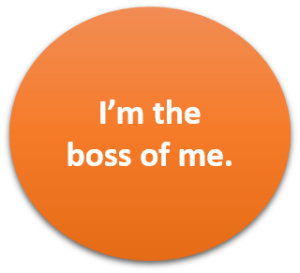
It took some people two or three years to regain their confidence and self-esteem after a terrible job, regardless of whether they were fired or quit on their own. Ugh. That is too long to let the jerks continue to have power over you. Fortunately, it doesn’t have to be this way. The people who bounced back quickly have this advice:
- Take back your power right now. Remind yourself as many times a day as you need to that this is your life. You get to choose whether you tell your coworkers “don’t talk to me like that” or quietly plot your exit while biting your tongue.
- You are more than your job. You are not your title, your company, or your salary. You are a whole person with many parts to your life. Know that your value as a human being is based on many things, but how your boss treats you is not one of them.
- You have skills and talents. When you feel low because you only hear what your manager thinks you are doing wrong, remember what you are good at. Write a list of your positive work traits if you need to. Take the Strength Finders test. Think of all you have accomplished in the past. When you’re scanning the job listings or updating your resume, this is the frame of mind to be in.
If you’ve left a horrible job or are currently in one, I hope you hold onto your self-worth and use what you’ve learned about the experience. You may come out on the other side with clearer boundaries, greater awareness of your strengths, and the confidence that comes from knowing that actually you are the boss of your own life.
Everything is an Illusion
 On Monday evening between work and an association meeting, I rushed to the grocery store to pick up the staples I’d run out of: juice, organic greens, carrots, milk and Ben & Jerry’s. I went to my usual grocery store, where I know exactly where everything is, so it should have taken me ten minutes. I roll my carts fast.
On Monday evening between work and an association meeting, I rushed to the grocery store to pick up the staples I’d run out of: juice, organic greens, carrots, milk and Ben & Jerry’s. I went to my usual grocery store, where I know exactly where everything is, so it should have taken me ten minutes. I roll my carts fast.
The first stop was the juice cooler at the end of the aisle next to the produce department. No Suja green juice for my breakfast smoothies. I turned the corner where they have a smaller juice cooler. Nope. I wheel down the aisle where I know there are other coolers and see different kinds of juice, but no Suja. I look up and down at every shelf. Fine. I put three bottles of other brands in my cart.
Back to the produce. Where the hell are the organic baby carrots? They are not where they usually are, they are not under the big banner that says “organic” and they are not by the six different kinds of non-organic carrots. After speed-wheeling around the entire produce section I get the regular carrots. They’re probably Monsanto, pesticide-laden, nutrient-deprived, flavorless sticks, but whatever. I was in a hurry.
At this point I notice the irritation I felt transform into rage. They have rearranged the store so that it looks almost the same as it used to, except they have moved or stopped carrying what I always buy.
There are so few things we can count on in life, and I was completely unprepared that knowing where things are in the grocery store was no longer one of them.
As I observed my inner rage, I limited my exterior reaction to a scowl on my face. I also acknowledged that since I was proud of myself for noticing my anger with detachment, I was both progressing in my spiritual enlightenment and still had enough work to do on my ego to continue hanging on Eckhart Tolle’s every word. Love him!
I continued scowling with detached rage towards the prewashed organic greens. I had to slow down to a normal grocery cart rolling pace so I could find the juicing greens that I wanted in an area that had tripled the number of lettuce containers. It took longer than usual to find what I wanted, but I did, and then was off to the dairy aisle. Along the way, I found a section of organic baby carrots, but said screw it, I was not going to backtrack all the way through the produce section to swap out one bag of carrots.
Thankfully, the milk and Ben & Jerry’s were where they should be. Although I was about to say something funny-sarcastic to a guy standing in front of the freezer, blocking my access. Then I recognized him as one of my neighbors and told him what I was about to say and we both laughed and chatted for a while.
At the checkout counter, the cashier asked if I found everything ok, and I said no, because a lot of stuff had moved and also there wasn’t any Suja juice in the now four separate juice locations. He called someone on one of those phones they have at their counters and then told me “Chris says we don’t stock that brand.” I told him I used to buy it RIGHT THERE, pointing at the juice cooler. He went on to tell me Chris has been at this store for twenty years, and if he says they didn’t stock it, he knows what he’s talking about.
I noticed with detachment that this isn’t very friendly customer service but I wasn’t even angry any more. I just wanted to pay so I could get home in time to unload the groceries and get to my meeting.
Then Chris appears with two small bottles of Suja juice and said they must be out of stock of the big bottles. My ego was so happy that the cashier was proven wrong that I lost several spiritual growth points.
Then the cashier handed me a card to take an online survey and said that if I rated them a 10 in customer service I would be entered to win a $100 gift card. That was so weird given the experience we had shared that for a moment I lost my ego completely. I was just pure consciousness, observing how strange humans are; how everything is an illusion.
And then I snapped out of it and ran my cart out to my car so I could get my ice cream home before it melted.
Because Tove Lo Made Eating Dinner in the Bathtub Acceptable
 When Tove Lo sings about eating dinner in the bathtub, I’m thinking “right on!” Now that is a great time-saving life hack. I also admire her determination to get over her broken relationship, but cannot recommend using the rest of her lyrics as advice.
When Tove Lo sings about eating dinner in the bathtub, I’m thinking “right on!” Now that is a great time-saving life hack. I also admire her determination to get over her broken relationship, but cannot recommend using the rest of her lyrics as advice.
I once thought doing a parody of Katy Perry’s “Last Friday Night” would be fun, but only got as far as standing on a bar room chair before I got yelled at by the bouncer. I didn’t even get to the dancing on the table tops part. It was good night, anyway. I played tambourine on stage with the band. Percussion instruments are my specialty.
Anyway, I mention that as another example of gleaning the wisdom wherever you can while having the sense to ignore the parts that are going to get you thrown out of a club or desperately picking up daddies on the playground. In case it isn’t clear, those parts are NOT good advice to emulate; they are the parts to ignore.
Anyway, back to eating dinner in the bathtub. As I mentioned in my recent blog post, I’m all for drinking coffee in the shower, or even making coffee while reclining in bed. Showering is not recommended for most solid foods, however, because obviously you’re risking your meal disintegrating in front of your eyes. A bath is more logical for solid foods, especially pizza or boxed chocolates because they are easy to grip and less likely to become blended with your bath oils. Tove Lo knows what she’s talking about here.
A commenter suggested upgrading the bedside coffee hack to include a mini-fridge in place of a traditional nightstand in order to make a complete breakfast. This shows real ingenuity, especially because it broadens the options for eating dinner in bed as well. If you’re having such a hard time waking up in the morning that you have to make breakfast in bed, you are also probably tired enough to go to bed at dinner time.
Taking the evening meal in bed has endless possibilities because you can prepare any food that you want in the kitchen first and then take it to bed on a plate or a wad of paper towels. If you have life hacked your way up to mini-fridge-nightstand status, even better. Skip the kitchen and make dinner in bed, too. That hour that you would have spent preparing, consuming and cleaning up after a meal translates into an extra hour in bed. Who’s not up for that?!
I’ve been a fan of eating dinner in bed for a long time. A full stomach makes one tired, so you’re on your way to falling asleep quickly. And on the other hand, if you take your laptop to bed in the evening, you might as well maximize your multitasking by answering emails or posting on Facebook while eating. Tip: taking breaks to clean your fingers with a wet wipe will prevent your keyboard from getting greasy.
 Years ago, someone said to me, “I wouldn’t kick you out of bed for eating crackers.” The compliment was totally lost on me – Southerners and their Southern charm! Because it is totally normal and expected to eat crackers in bed. Anything you can eat out of the container it came in is a natural bedtime food choice.
Years ago, someone said to me, “I wouldn’t kick you out of bed for eating crackers.” The compliment was totally lost on me – Southerners and their Southern charm! Because it is totally normal and expected to eat crackers in bed. Anything you can eat out of the container it came in is a natural bedtime food choice.
I regularly settle under the covers for the night with a pint of Ben and Jerry’s or a box of crackers. It’s not like I eat junk food all the time, unlike Tove Lo and her Twinkies. I often choose gluten-free crackers. Sometimes I’ll even eat raw carrots; as many as will fit into an improvised paper towel baggie.
So there you have it. Just as coffee in bed immediately upon waking is recommended to jump-start your day, so is ending it on a comforting note by snuggling under the covers with your dinner.
Well. I guess there’s one more thing. Remember that you can find wisdom in just about anything if you’re looking for it. Just be sure to separate out the helpful information from the bad advice.


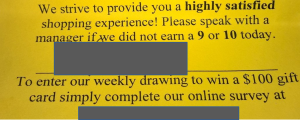

Recent Comments